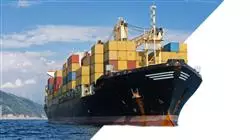University certificate
The world's largest school of business”
Why study at TECH?
This program offers you exclusive content on Port Infrastructures and Sustainability in just 450 hours of online study"

Why Study at TECH?
TECH is the world's largest 100% online business school. It is an elite business school, with a model based on the highest academic standards. A world-class center for intensive managerial skills education.
TECH is a university at the forefront of technology, and puts all its resources at the student's disposal to help them achieve entrepreneurial success”
At TECH Global University
|
|
Innovation |
The university offers an online learning model that balances the latest educational technology with the most rigorous teaching methods. A unique method with the highest international recognition that will provide students with the keys to develop in a rapidly-evolving world, where innovation must be every entrepreneur’s focus.
"Microsoft Europe Success Story", for integrating the innovative, interactive multi-video system.
|
|
The Highest Standards |
Admissions criteria at TECH are not economic. Students don't need to make a large investment to study at this university. However, in order to obtain a qualification from TECH, the student's intelligence and ability will be tested to their limits. The institution's academic standards are exceptionally high...
95% of TECH students successfully complete their studies.
|
|
Networking |
Professionals from countries all over the world attend TECH, allowing students to establish a large network of contacts that may prove useful to them in the future.
100,000+ executives prepared each year, 200+ different nationalities.
|
|
Empowerment |
Students will grow hand in hand with the best companies and highly regarded and influential professionals. TECH has developed strategic partnerships and a valuable network of contacts with major economic players in 7 continents.
500+ collaborative agreements with leading companies.
|
|
Talent |
This program is a unique initiative to allow students to showcase their talent in the business world. An opportunity that will allow them to voice their concerns and share their business vision.
After completing this program, TECH helps students show the world their talent.
|
|
Multicultural Context |
While studying at TECH, students will enjoy a unique experience. Study in a multicultural context. In a program with a global vision, through which students can learn about the operating methods in different parts of the world, and gather the latest information that best adapts to their business idea.
TECH students represent more than 200 different nationalities.

|
|
Learn with the best |
In the classroom, TECH’s teaching staff discuss how they have achieved success in their companies, working in a real, lively, and dynamic context. Teachers who are fully committed to offering a quality specialization that will allow students to advance in their career and stand out in the business world.
Teachers representing 20 different nationalities.
TECH strives for excellence and, to this end, boasts a series of characteristics that make this university unique:
|
|
Analysis |
TECH explores the student’s critical side, their ability to question things, their problem-solving skills, as well as their interpersonal skills.
|
|
Academic Excellence |
TECH offers students the best online learning methodology. The university combines the Relearning methodology (the most internationally recognized postgraduate learning methodology) with Harvard Business School case studies. A complex balance of traditional and state-of-the-art methods, within the most demanding academic framework.
|
|
Economy of Scale |
TECH is the world’s largest online university. It currently boasts a portfolio of more than 10,000 university postgraduate programs. And in today's new economy, volume + technology = a ground-breaking price. This way, TECH ensures that studying is not as expensive for students as it would be at another university.
At TECH, you will have access to the most rigorous and up-to-date case analyses in academia”
Syllabus
The Postgraduate diploma in Port Infrastructures and Sustainability is an academic qualification that is oriented in detail to relevant competencies related to information flows in port operations, Infrastructure development and dangerous goods management programs. All this, situated from a theoretical-practical position together with a wealth of experience and extensive knowledge of an excellent teaching team that addresses this field of study.
A syllabus developed by experts and quality content are the key for your learning about Port Infrastructure and Sustainability to be successful"
Syllabus
This Postgraduate diploma aims to place students in the best professional positions according to the different obstacles that may arise in the development of their career in Port Infrastructure and Sustainability. In this way, this program provides multiple resources and technical tools, obtaining exclusive knowledge in port terminal management, evaluation of infrastructure development plans and coordination with public security agencies.
In order to achieve the established goals, the teaching staff has developed an interesting agenda that employs 3 modules, so that the professionals expands and enhances their vision of knowledge in electricity supply to ships, design of projects of electrification of docks and technological trends in port security.
The students will consolidate their knowledge on specific aspects of sustainable port-city relations, focused on concepts such as climate change and design of port-city spaces. In addition, it will delve into the identification of threats and vulnerabilities.
This is a program that integrates a specialized teaching team, supported by a quality multimedia content that offers dynamism.
Also, TECH takes into account comfort and excellence, that is why this pogram offers a complete and quality learning, while providing flexibility to study. Graduates only need a device with an Internet connection to easily access the virtual platform, 24 hours a day and from anywhere in the world.
This Postgraduate diploma takes place over 6 months and is divided into 3 modules.
Module 1. Maritime-port Logistics and Port Services
Module 2. Planning and Development of Infrastructure and Environmental Sustainability
Module 3. Port Security and Security

Where, When and How is it Taught?
TECH offers the possibility of developing this Postgraduate diploma in Port Infrastructure and Sustainability completely online. Throughout the 6 months of the educational program, you will be able to access all the contents of this program at any time, allowing you to self-manage your study time.
Module 1. Maritime-port Logistics and Port Services
1.1. Port Community
1.1.1. Port Community
1.1.2. Key Actors of the Port Community
1.1.3. Applied Quality Management Systems to the Port Community
1.2. Port Operations
1.2.1. Port operations and activities in port
1.2.2. Information systems in the port operations
1.2.3. Information flows in the port operations
1.3. Port logistics
1.3.1. Port logistics
1.3.2. Ports as logistical nodes in the global supply chain
1.3.3. Logistics in transport by container
1.4. General management of the port
1.4.1. General organization of sea and land traffic in a port
1.4.2. Entry of ships into port
1.4.3. Allocation of mooring and docking posts
1.4.4. Stays of ships and internal movements
1.4.5. Movement of vehicles and persons in port
1.4.6. Passengers and goods
1.5. Management of a port terminal
1.5.1. Levels of analysis
1.5.2. Planning of port terminals
1.5.3. Productivity indicators
1.6. Port Services
1.6.1. Regulation of port services
1.6.2. Public service obligations
1.6.3. Types of port services
1.7. Technical and nautical services
1.7.1. Mooring
1.7.2. Port trailer
1.7.3. Pilotage
1.8. Goods, passengers and waste reception services
1.8.1. Goods handling service
1.8.1.1. Loading and stowing activities
1.8.1.2. Activities in the field of waste disposal
1.8.1.3. Possible operations exempted from stowage and disposal
1.8.2. Ship generated waste reception service
1.8.3. Passenger service
1.9. Commercial services to the vessel
1.9.1. Victualling
1.9.2. Fuel supply
1.9.3. Supply of LNG
1.9.4. Supply of electricity to ships
1.10. Maritime signalling service
1.10.1. Types of Aids to navigation
1.10.2. Visual aids
1.10.3. Acoustic aids
1.10.4. Radio aids
1.10.5. VTS
1.10.6. The Marking System Maritime IALA
Module 2. Planning and Development of Infrastructure and Environmental Sustainability
2.1. Sustainable Port Planning
2.1.1. Legislation: Fit for 55 and EU ETS
2.1.2. Relations with other continents
2.1.3. Relations with the International Maritime Organisation (IMO)
2.2. Port planning instruments and adaptation to the new climate reality
2.2.1. Master Plans
2.2.2. Planning Tools for Infrastructure Development
2.2.3. Port terminal design and redesign: electrification plans
2.2.4. Sustainable port-city relations: Climate change and design of port-city spaces
2.3. Environmental assessment of instruments port planning
2.3.1. Programs for the development of infrastructure
2.3.2. Evaluation of development plans infrastructure
2.3.3. Evaluation of Infrastructure Projects
2.4. Project financing of sustainable development of port infrastructure
2.4.1. The European Investment Bank
2.4.2. The World Bank
2.4.3. The Inter-American Development Bank
2.4.4. International investment funds
2.4.5. Issuance of green bonds
2.5. Ports and coastal erosion: Working with Nature
2.5.1. Projects for the preservation of estuaries
2.5.2. Coastal regeneration projects
2.5.3. Projects for the re-use of sediments
2.6. Renewable energy investment projects
2.6.1. Wind power generation projects on shore and off shore
2.6.2. Photovoltaic energy projects on shore and off shore
2.6.3. Other renewable energy sources
2.7. Assessment of the profitability of investment projects. MEIPORT methodology
2.7.1. Analysis of the project context and objectives
2.7.2. Alternative analysis
2.7.3. Project definition
2.7.4. Financial Analysis.
2.7.5. Economic Analysis
2.7.6. Sensitivity and risk analysis
2.8. Applied BIM technology to ports
2.8.1. Design of port terminals
2.8.2. Design of dock electrification projects
2.8.3. Design of access projects land to ports
2.9. Monitoring instruments and protection of the marine environment
2.9.1. Measuring nets: buoys, tide gauges and high frequency radar
2.9.2. Elements for maritime climate prediction and change scenarios
2.9.3. Projects
2.10. Blue Economy
2.10.1. Blue Economy Dimensions
2.10.2. Projects for the preservation of marine ecosystems
2.10.3. Ports and climate research centres and marine: towards a long-term relationship
Module 3. Port Security and Security
3.1. Port Security
3.1.1. Port Security
3.1.2. Safety and security
3.1.3. Regulations and international standards
3.2. Technological and Industrial Safety in Ports
3.2.1. Management of dangerous goods
3.2.2. Prevention of industrial accidents
3.2.3. Safety procedures in the handling and transport of goods
3.3. Port security Planning for the safety
3.3.1. Threat identification and vulnerabilities
3.3.2. Risk analysis and assessment protective
3.3.3. Risk mitigation strategies. Protection plans
3.4. Physical and electronic protection
3.4.1. Design of physical protection systems
3.4.2. Access control and monitoring
3.4.3. Security technologies in ports
3.5. Logical and cyber security in ports
3.5.1. Cyber threats and specific vulnerabilities
3.5.2. Strategies for port cybersecurity
3.5.3. Responding to cyber incidents
3.6. Crisis and Emergency Management
3.6.1. Emergency response planning
3.6.2. Coordination with agencies public safety
3.6.3. Simulations and response exercises
3.7. Relations with the Community and Communication in Crisis
3.7.1. Importance of communication with the community
3.7.2. Communication strategies in crisis situations
3.7.3. Corporate social responsibility in ports
3.8. Management of a Department security
3.8.1. Management of public and private security
3.8.2. Safety planning
3.8.3. Material Resources
3.8.4. Human resources management and training
3.9. Prevention and Protection
3.9.1. Recommendations for antisocial risks
3.9.2. Recommendations against risk of fire
3.9.3. Recommendations for occupational risks
3.10. Innovation and the Future of Port Security
3.10.1. Technological trends in port security
3.10.2. Artificial intelligence and data analysis
3.10.3. Preparing for future challenges

A unique training experience, key and decisive to boost your professional development”
Postgraduate Diploma in Port Infrastructures and Sustainability
In an interconnected and sustainability-oriented world, the efficient management of port infrastructures has become essential. Based on this, TECH Global University presents a very complete Postgraduate Diploma, a program designed for those seeking to excel in the field of port logistics and contribute to the sustainable development of these important facilities. The program is offered in online mode, giving you the necessary flexibility to access quality content from any location. This mode not only adapts to your schedule, but also immerses you in a collaborative online environment that will enrich your learning experience. One of the key advantages of this program is its practical and applied approach, you will face real situations and challenges in the industry, which will allow you to apply your theoretical knowledge in practical scenarios.
Get a Postgraduate Diploma in Port Infrastructures and Sustainability
At TECH Global University we understand the importance of combining the principles of sustainability with the efficient management of port infrastructures. That's why our program focuses on providing you with specialized knowledge on the design, operation and continuous improvement of ports, integrating sustainable practices at every stage of the process. In addition, you will be mentored by leading professionals and experts in port infrastructure who will share their experience and knowledge with you. Sustainability is a fundamental pillar of modern port management, and our program will provide you with the tools you need to address the environmental, social and economic challenges associated with these infrastructures. You will be prepared to lead sustainable initiatives and contribute to the development of environmentally friendly and socially responsible ports. Transform your career and become an expert in port infrastructure and sustainability. Join us on this educational journey that will not only boost your professional growth, but also allow you to make a difference in the future of this industry.

















